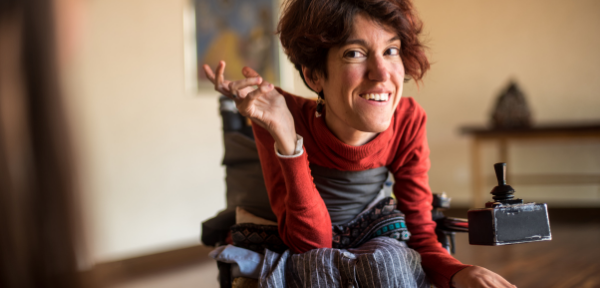EASPD is ready to help implement promising new Disability Strategy

On 3rd March 2021, the European Commission launched the new Strategy for the Rights of Persons with Disabilities 2021-2030. The Strategy gives a clear direction to service provision for persons with disabilities and proposes achievable & ambitious initiatives the EU can take to help the implementation of the UN Convention on the Rights of Persons with Disabilities. For the European Association of Service providers for Persons with Disabilities (EASPD), its effective implementation will require partnership with service providers to build on their promising practices, innovative ideas and local know-how.
Having ratified the UN Convention on the Rights of Persons with Disabilities over a decade ago, the European Commission launched yesterday its new Strategy for the Rights of Persons with Disabilities 2021-2030. Building on the progress made over the past decade, the new Strategy includes a broad series of measures supporting the Commission’s practical commitment towards the UN CRPD, within its own competences, as well as to support and build on the work achieved at national and regional level.The new Strategy covers significant ground and shows a clear direction for the development of service provision for persons with disabilities: in the field of employment towards decent jobs on the mainstream labour market and in social entreprises, in the field of education towards inclusive forms of lifelong learning, in the field of social services towards community-based services and supported decision-making, as well as in health, digitalization, early intervention, ageing, arts, culture and sport. It also highlights many of the concrete barriers to these developments, highlighting for instance issues of staff shortages, legal capacity and the training of professionals. Perhaps most importantly, European Commission committed on a series of ambitious yet achievable initiatives the to facilitate the implementation of the UN CRPD; including within the field of service provision. This includes:
- Building a European Framework for Social Services of Excellence for persons with disabilities, to improve service delivery and enhance the attractiveness of jobs in this area (by 2024);
- Issuing Guidance recommending to Member States improvements on independent living and inclusion in the community (by 2023);
- A package to improve labour market outcomes of persons with disabilities (by 2022), an Action Plan on Social Economy, as well as helping Member States set employment rate targets and strengthen the capacities of employment services for persons with disabilities;
- Building on the result of the Blueprint for sectoral cooperation on skills; including through the B-WISE project co-coordinated by EASPD and ENSIE which will create a European Strategy for Skills in Work Integration Social Entreprises;
- Create synergies with the upcoming European Child Guarantee and a toolkit for inclusion in early childhood education and care, with a specific chapter on children with disabilities (by 2021);
- Supporting Member States to further address the competences of all education professionals to manage diversity in the classroom and develop inclusive education;
- Further directing the EU Budget and Recovery Fund towards implementing the strategy, in particular in the field of deinstitutionalisation;
- And many other activities linked to healthcare, digitalization, supported decision making, legal capacity, voting rights, access to culture and sports, ageing persons with disabilities, intra-EU mobility, cooperation, humanitarian action, and more...
Presenting the new European Strategy for the Rights of Persons with Disabilities 2021-2030 to EASPD members, Ms Katarina Ivanković-Knežević, Director for Social Affairs at the European Commission, said that the Strategy is a result of a large consultation and welcomed EASPD as a good partner for bringing new topics on the agenda. She highlighted that the Strategy was ambitious but not too ambitious and sets a clear agenda for the years to come, including clear monitoring, indicators and data collection where the Commission wants to lead by example and work with Member States on the implementation of the UN Convention on the Rights of Persons with Disabilities in Europe.
Responding to the launch of the new European Disability Strategy, Mr Luk Zelderloo, Secretary General EASPD stated that “we are ready, ready to put in the hard work needed to make sure the new Strategy has a real impact on the ground, in the work of service providers, in the lives of persons with disabilities. Step by step, this Strategy will bring change. To do so, we need to focus on making the most of innovation in service provision, collecting the right data and working in partnerships, in co-production, with all stakeholders around the table”.
Over the next few weeks, EASPD will analyse the European Disability Strategy in more depth and begin the process of developing practical solutions to support the implementation of this new and exciting European Strategy on the Rights of Persons with Disabilities 2021-2030. EASPD will also work with the Council of the European Union to ensure that the Council Conclusions adequately reflect the Member States’ responsibilities in implementing this Strategy. This work will all be done within the broader vision of the Action Plan on the European Pillar of Social Rights, launched today.
Supporting Documents:
- Strategy for the Rights of Persons with Disabilities 2021-2030
- Action Plan on the European Pillar of Social Rights
For more information, please contact:
Rachel Vaughan
EASPD Operations Manager
+32 2 233 77 20
rachel.vaughan@easpd.eu
www.easpd.eu
Thomas Bignal
EASPD Policy Manager
+32 2 233 77 23
thomas.bignal@easpd.eu
www.easpd.eu

